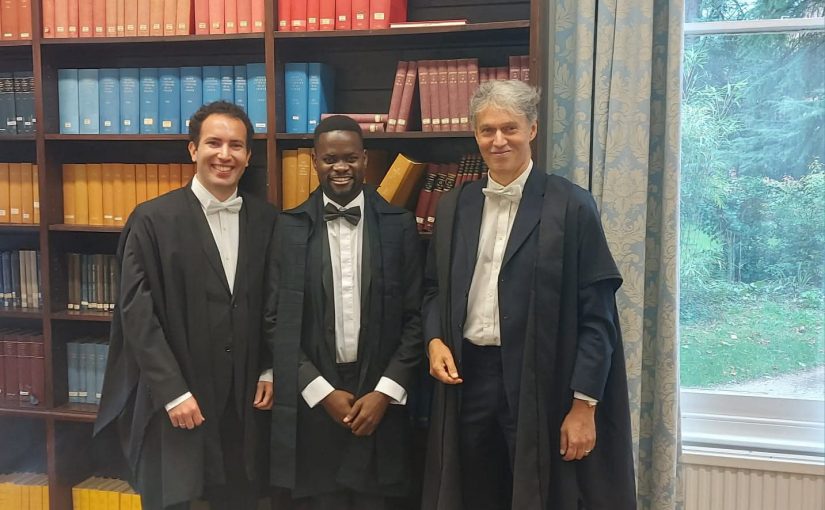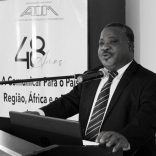Mozambique: Buddhist charity has supported over 2,000 malnourished children in Sofala since 2021
Jacinto Mathe earns doctorate at Oxford, becomes Mozambique’s first PhD in Palaeoanthropology: Gorongosa in the heart

Photo: Jacinto Mathe Adriano/Facebook
Jacinto Mathe Adriano recently earned his doctorate from the prestigious University of Oxford in the United Kingdom, becoming the first Mozambican to specialise in palaeoanthropology. His PhD research focused on the last frontiers of the African Rift Valley and the environments of human origins.
As part of his study, Mathe surveyed and collected osteological samples across various landscapes in Gorongosa National Park, Mozambique. He also carried out ecological analyses of the bones, aiming to provide information for conservation efforts and to establish links between modern environments and the African fossil record.
Jacinto Mathe was born with a congenital malformation that caused bilateral clubfoot, a condition that makes movement difficult. Still, he never gave up on overcoming challenges. His academic journey has been remarkable: he obtained a degree in Veterinary Medicine (Eduardo Mondlane University in Mozambique ) followed by a Master’s in Forensic Anthropology (University of Coimbra, Portugal), and this September 2025 he earned his doctorate in Palaeoanthropology.
With a life journey far from easy, Jacinto Mathe believes that this doctorate brings him even more responsibilities—not only for studying and understanding humanity’s prehistoric past, but also among young people, being already seen as an example that anyone can achieve their dreams and be able to affirm that the sky is the limit…
RFI: You recently obtained a doctorate in Palaeoanthropology from the University of Oxford. What is your current feeling, knowing that you are the first Mozambican to obtain this specialisation?
Jacinto Mathe: The feeling and significance is, firstly, that sky is the limit, and that all of us need to work so hard—and whenever the opportunities arise they are always to be grasped. At the same time I feel a great responsibility to pass on what I have acquired over these five years at such a prestigious university, and I already am, in fact, seen as a role model, so I hope others might look to me as someone to follow. It is a great responsibility, but also a great honour to be among the pioneers in this field in Mozambique.
To my knowledge to date, I am the first Mozambican to hold a specialisation in this area of biological anthropology and specifically, in my case at the University where I obtained the doctorate – the University of Oxford. Yes, I am the first Mozambican so far.
RFI: Can this journey lead to the inspiration and awakening of many young Mozambicans’ vocations?
Jacinto Mathe: Yes. I have already had the privilege of being involved in collaborations with different researchers, national and international, and along this path I realised that nobody walks alone. Now it will be a huge privilege and tremendous honour to help other Mozambicans grow in their academic life. I see this as a unique opportunity. I am open to collaboration, and in fact I have used one of these avenues to reach out and say that we are here because someone invested—and I will be ready to contribute to the careers of many.
RFI: Your research centred especially on the implications of bones and ecology in the Southern Rift Valley for understanding human evolution. There is still much work to be done in this field?
Jacinto Mathe: Yes, there is much work in this area where someone can serve as a bridge between palaeoanthropology itself, the study of very ancient things—millions and millions of years old—and someone who studies more recent things; in this case specialists in ecology. I am as though a linking bridge, and in this area the latest published works date to around 2007, 2008, 2009, and since then until now there is nothing recent published in this field. This means that globally, not just in Mozambique, not just in Africa, there is a research gap. Who will be the next person to fill this gap will, in large part, be Mozambique, since we already have one of the first specialists—myself—to collaborate with others. So yes, it is a huge chance to fill this gap in research.
RFI: The Gorongosa National Park is for you a place that has been a cradle and a continuous place of learning?
Jacinto Mathe: Yes, Gorongosa is a special place in many respects and in many ways. First because of its geographical location: we know very well it is located at the last great portion of the African Rift Valley and all the countries that had this geological structure made their contribution to what we call the birthplace of humanity—first in these ancestral cases. And on the other hand we have a combination of caves, more than 30 well-documented and mapped caves, analogous to those found in South Africa, which also contributed in an unambiguous way to what I study, human evolution.
So Gorongosa is special in that sense, not only because of that, but also because of its diversity. Because, largely due to the civil war which devastated a lot, but its recovery—its story of recovery—is a model both in Africa and the world in the recovery of wildlife, which now is growing spectacularly. So it is very interesting to have a place such as this, and I feel honoured to be part of the team, to be part of the generation of the Gorongosa project.
RFI: In your opinion, are local and state authorities aware of the importance of the research you are doing along with other specialists, especially in Mozambique?
Jacinto Mathe: Yes, they are aware. Gorongosa has a programme for young Mozambican scientists, where our research is shown on local television; this increases the impact of Gorongosa’s work, not only in my field but also in other areas.
Yes, they are aware.
We have the first osteological collection in a national park in Mozambique, which everyone has the privilege to visit whenever they have a little time to spend in Gorongosa. It is one of the places people really want to be and spend more time, and there we seize the opportunity to collaborate with teaching institutions—universities, higher institutes—that are already in contact. One of the Mozambicans I am now supervising is, as we speak, based in Gorongosa National Park.
RFI: Returning to your recent doctorate at the University of Oxford, and speaking now about someone whom I believe is very important in your journey, your mentor, Professor Susana Carvalho, was one of the driving and inspiring forces in this process…
Jacinto Mathe: Yes. I always say that life works like a sisal rope. Each strand contributes to growth and to the construction of the rope itself, making it strong enough perhaps even to pull a car or any vehicle. And in that metaphor of not growing alone, I have Professor Susana as mentor, not only did she enter my life during the doctorate, but even much earlier, in 2017, when I was a Biodiversity Research Fellow at Gorongosa.
Since then, she has followed my path step by step, together with Professor René Bobe, who also had a great impact on my research. Both have worked alongside me to what I already feel today.
RFI: We know your path in life has been difficult, we cannot ignore that, but with results we can say you are happy with today…
Jacinto Mathe: Yes… to a large extent my motivation for focusing on this area in which I specialise is that the central object of study are bones, carcasses, different types in this case. How they are preserved, how they are decomposed in various places. This interest comes from my own personal story, from the congenital malformation I had, which was corrected, in Portugal, I had the privilege of having that correction, which is called clubfoot. It made me want to understand bones better, the centre, how it all happened, what are the associated factors, and I became passionate about this field.












Leave a Reply
Be the First to Comment!
You must be logged in to post a comment.
You must be logged in to post a comment.